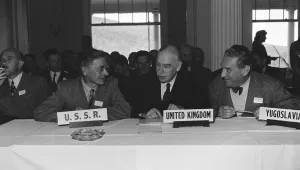International Security is America's leading peer-reviewed journal of security affairs.

Summary
Increasingly, states are employing global economic networks to fulfill their strategic objectives. A structural explanation of this phenomenon argues that network topography produces enduring power imbalances among states. As asymmetric network structures centralize power in key nodes, some states are able to “weaponize interdependence” to gather valuable information or to deny network access to adversaries. The United States has leveraged its network advantage in the realms of counterterrorism and nonproliferation.
Henry Farrell and Abraham L. Newman, “Weaponized Interdependence: How Global Economic Networks Shape State Coercion,” International Security, Vol. 44, No. 1 (Summer 2019), pp. 42–79, doi.org/10.1162/ISEC_a_00351.
The full text of this publication is available in the link below.



